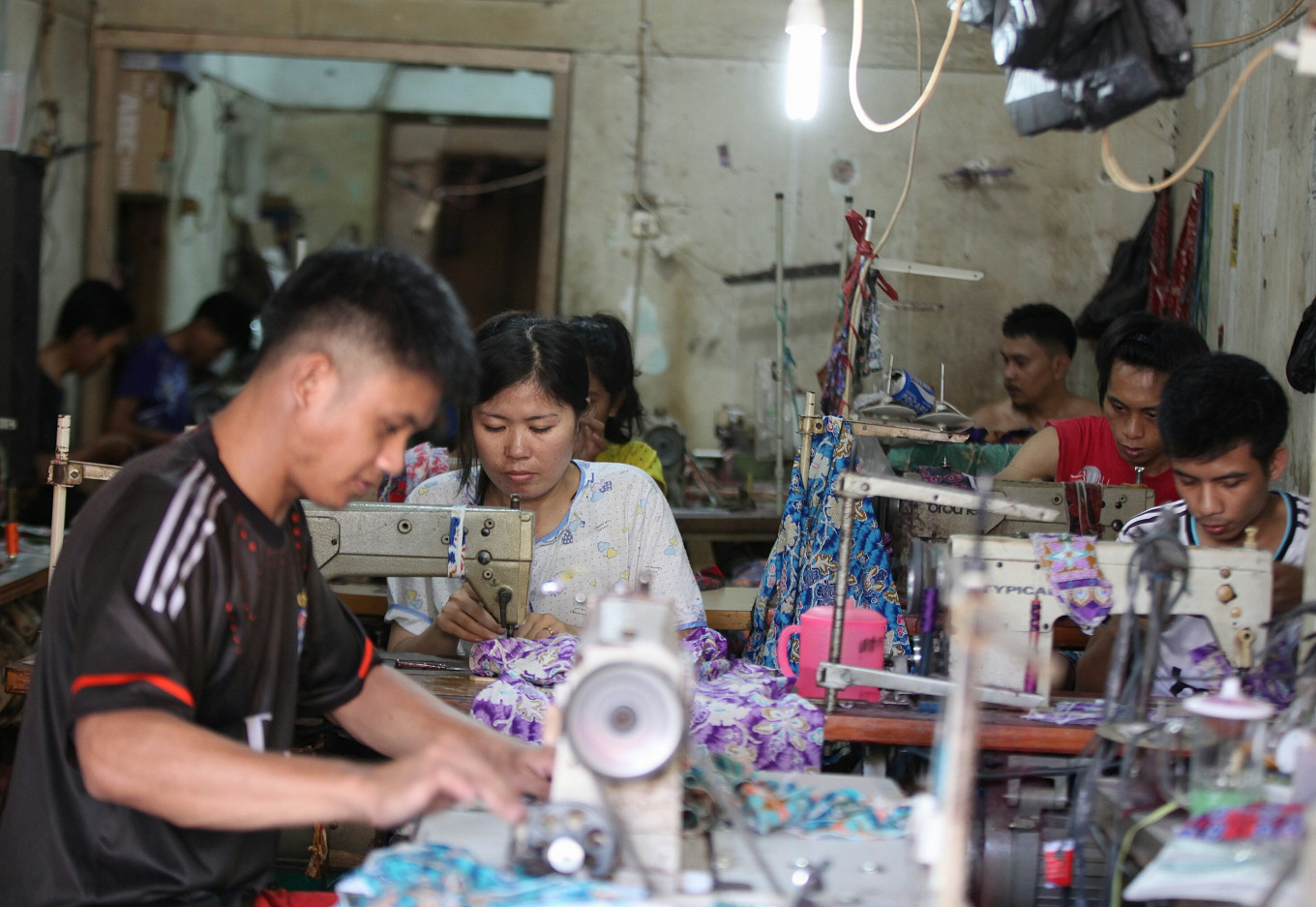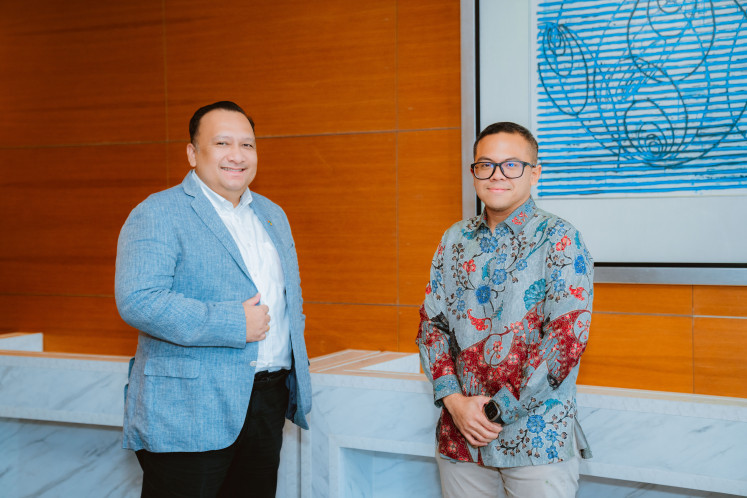Popular Reads
Top Results
Can't find what you're looking for?
View all search resultsPopular Reads
Top Results
Can't find what you're looking for?
View all search resultsCarrying on from Jokowi, new government to continue to propel MSMEs’ growth
Change text size
Gift Premium Articles
to Anyone
M
icro, small and medium enterprises (MSMEs) have been in the limelight throughout the 10 years of President Joko “Jokowi” Widodo’s administration, with the Directorate General of Taxation of the Ministry of Finance taking concrete steps to reinforce their venture performance.
Under the Jokowi administration, MSMEs were among the primary targets of the national strategic program, a fact that reflects the government’s achievements in making fundamental performance improvements in strategic sectors.
With his Onward Indonesia Cabinet, Jokowi embarked on pro-MSME policies in 2015 with his first term and gave them further heed when the COVID-19 pandemic hit the country, which brought unprecedented challenges for MSMEs. These policies included launching a program to provide working capital assistance for micro entrepreneurs categorized as poor and were thus vulnerable to the impacts of the pandemic.
Ahead of the change in government, the financial performance of the state is once again under scrutiny, leading to growing curiosity about revenue performance.
As the backbone of Indonesia’s economy, MSMEs have dominated the national economic structure, reaching 65 million businesses and accounting for 61 percent of gross domestic product (GDP) as well as 97 percent of domestic employment.
On the other hand, the data show that big corporate actors with strong resources control the biggest slice of the economic pie.
Dwi Astuti, director of tax dissemination, services and public relations at the Directorate General of Taxation, said: “A variety of empowerment programs for MSMEs have been conducted to enhance their competitive edge and performance. These include tax incentives.”
The final income tax has been revised down to 0.5 percent from previously 1 percent, while a significant incentive has been implemented of up to Rp 500 million per year in nontaxable income for private MSMEs.
Dwi Astuti noted that despite their large number, MSME entrepreneurs were unable to compete when it came to their individual contributions, and required the government’s serious response to safeguard the foundation of the national economy’s future.
“One effort is strengthening a crucial aspect of MSMEs’ resilience, namely the capacity of their human resources and skills in financial management,” she said.
Tax contribution was an obligation for all businesses, Dwi Astuti said, “And yet, given the characteristics of MSMEs, asking them to fulfill the tax obligation as we do for big corporations will place a burden on them.”
“Therefore, we have adopted a friendly approach with MSMEs through our Business Development Service [BDS] initiative, and imposed a final income tax of 1 percent that prioritizes simplicity and ease in [accounting].”
The imposition of tax incentives for MSMEs has encouraged more MSMEs players to pay tax thanks to the simplified procedure, which has led to a rise in tax revenue.
“Unlike in the past, when MSMEs thought that tax was a big deal, now they view that tax is a simpler thing with the imposition of a simple tariff,” she said.
The endeavors of the Directorate General of Taxation to simplify procedures are indispensable to taxpayers and align with what Mariona Mas-Montserrat, Céline Colin, Eugénie Ribault and Bert Brys said in an OECD taxation working paper titled “The Design of Presumptive Tax Regimes”.
According to the paper, simplified administrative procedures make presumptive regimes attractive to taxpayers, as they often allowed for simplified accounting rules and procedures, such as cash accounting instead of accrual accounting.
In addition, presumptive regimes reduce the frequency of tax filings and payments. For example, options to make annual payments by installment and tax returns are less complex compared to the standard tax system, the paper states.
Mas-Montserrat et al. also states that interacting with a single public counterpart eases the administrative burden on taxpayers, since public bodies are represented by various institutional structures such as ministries, agencies and departments, all with mandates that could overlap.
“For example, a small business may be required to enroll in the [national] business registry, obtain a [local] business license and register employees [for social security], sometimes with the obligation to provide similar documentation to each institution,” the paper notes.
It also reveals that digital services simplify administrative procedures for taxpayers.
“In particular, declaring and paying taxes and social security contributions online or by mobile phone can help to reduce the time spent on administrative matters,” the paper says.
Dwi Astuti further noted that the Directorate General of Taxation had implemented the BDS program vertically, which nurtured a close relationship between MSMEs and the tax office.
The concept of MSMEs moving up to a higher class referred to he strengthening MSMEs’ performance by scaling up their capacity in business operations and providing them with greater room for movement with regard to government regulations and policies.
Limited market access, lack of skilled human resources, lack of digital skills and limited access to financial services are among the challenges MSME entrepreneurs face, according to experts. The data show that around 18 million MSMEs still have no access to formal financial services, while 46 million MSMEs require additional financing for business capital and investment.
As such, while providing tax education through training workshops at regional tax services, Dwi Astuti said, the Directorate General of Taxation also disseminated information on government facilities and protection to educate Indonesian MSMEs, in collaboration with related institutions and organizations.
Under the Jokowi administration, the government also pushed for the digital transformation of MSMEs as part of the national economic recovery program, which designed a 2024 target to digitalize 40 million MSMEs as one of the most important pillars for recovery, alongside health care and social protection.
Since 2016, the Directorate General of Taxation has introduced educational opportunities to MSMEs under the BDS initiative to equip small business owners with the key skills and knowledge to maintain and grow their key skills and knowledge.
“For example, we give them techniques in [...] digital marketing, how to prepare attractive product packaging and tips on accessing funding from banks,” said Dwi Astuti.
“We teach women MSME [entrepreneurs] how to use social media platforms for online sales and as a marketing tool. We also raise their awareness that being engaged in [a business] venture is not merely a way of day-to-day life, but also a long-term business activity,” she said.
“The goal of the program is to enable MSMEs to move up to a higher class and this way, their turnover also increases. [...] Since the program was launched in 2016, we have reached out more than 200,000 MSME actors.”
The Directorate General of Taxation implement the BDS program on a routine basis each year.
Looking ahead, the tax office remains committed to empowering and growing the number of MSME entrepreneurs under the new government so they can move upward to a higher taxation class.
“The directorate general is committed to supporting MSMEs’ business growth through the BDS program and therefore, we look forward to collaborating with the Ministry of MSMEs,” said Dwi Astuti.
Source: The Directorate General of Taxation (DGT)










